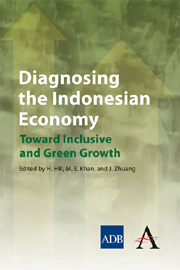Book contents
- Frontmatter
- Foreword
- Preface
- Author Profiles
- Abbreviations and Acronyms
- Contents
- 1 Introduction
- 2 Development Policies and Performance
- 3 Critical Constraints to Growth
- 4 Critical Constraints to Reducing Poverty and Inequality
- 5 Macroeconomic Management
- 6 Industrialization: Patterns, Issues, and Constraints
- 7 Infrastructure Development: Challenges and the Way Forward
- 8 Human Capital and Economic Development
- 9 Economic Growth, Employment Creation, and Poverty Alleviation
- 10 Poverty Reduction: The Track Record and Way Forward
- 11 Decentralization
- 12 Making Indonesia's Growth Green and Resilient
- Index
11 - Decentralization
Published online by Cambridge University Press: 05 May 2012
- Frontmatter
- Foreword
- Preface
- Author Profiles
- Abbreviations and Acronyms
- Contents
- 1 Introduction
- 2 Development Policies and Performance
- 3 Critical Constraints to Growth
- 4 Critical Constraints to Reducing Poverty and Inequality
- 5 Macroeconomic Management
- 6 Industrialization: Patterns, Issues, and Constraints
- 7 Infrastructure Development: Challenges and the Way Forward
- 8 Human Capital and Economic Development
- 9 Economic Growth, Employment Creation, and Poverty Alleviation
- 10 Poverty Reduction: The Track Record and Way Forward
- 11 Decentralization
- 12 Making Indonesia's Growth Green and Resilient
- Index
Summary
Introduction
This chapter diagnoses Indonesia's experiences with decentralization. The historical focus is on the period from the commencement of “big bang” decentralization reforms in 1999 until early 2010. The policy focus is on the medium-term period of 2010–2015. The study of decentralization in any country typically involves a complex mix of historical, political, administrative, financial, economic, and governance elements. The study of decentralization in Indonesia in many ways involves even more than the usual range of complexities, because of the volatilities of recent history and politics, the country's highly regulated and complex administrative systems, the widely dispersed geographic nature, and large population of about 235 million people. Indonesia's complexities can lead to generalized national assessments of how decentralization is progressing, but the reality is widely differing experiences across the archipelago.
Much of the emphasis in this chapter is on fiscal and economic aspects of decentralization. However, the chapter also touches on political, administrative, and governance elements that, taken together with financial and economic matters, comprise an attempt to address the broader political economy of decentralization in Indonesia. Commonly stated higher level objectives for decentralization in Indonesia include improved local-level delivery of government services and better social and economic development outcomes (higher regional growth, reduced poverty, increased employment, etc.). While some of these objectives may be beyond the scope and capacities of regional governments (RGs) to deliver, they provide a broad framework as to what this diagnosis covers.
- Type
- Chapter
- Information
- Diagnosing the Indonesian EconomyToward Inclusive and Green Growth, pp. 389 - 428Publisher: Anthem PressPrint publication year: 2012



